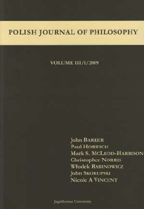‘Nothing over and above’ or ‘nothing’? On Eliminativism, Reductionism, and Composition
‘Nothing over and above’ or ‘nothing’? On Eliminativism, Reductionism, and Composition
Author(s): Jiri BenovskySubject(s): History of Philosophy, Philosophical Traditions, Special Branches of Philosophy
Published by: Instytut Filozofii Uniwersytetu Jagiellońskiego
Keywords: eliminativism; reductionism; composition
Summary/Abstract: In this article, I am interested in an issue concerning eliminativism about ordinary objects that can be put as the claim that the eliminativist is guilty of postulating the existence of something (atoms arranged tablewise), but not of something that is identical to it (the table). But, as we will see, this turns out to be a problem for everybody except the eliminativist. Indeed, this issue highlights a more general problem about the relationship between an entity and the parts the compose it. Furthermore, I am not interested in this issue only for its own sake and for the sake of understanding and defending eliminativism, but also for the way it allows me to discuss the differences and relations between eliminativism and reductionism. What difference is there between eliminating an entity and reducing it to something else?
Journal: Polish Journal of Philosophy
- Issue Year: IX/2015
- Issue No: 2
- Page Range: 7-17
- Page Count: 11
- Language: English
- Content File-PDF

